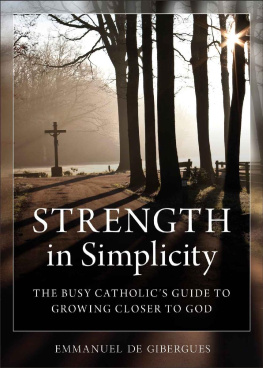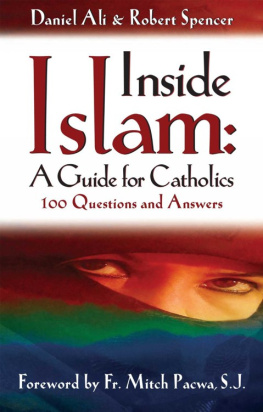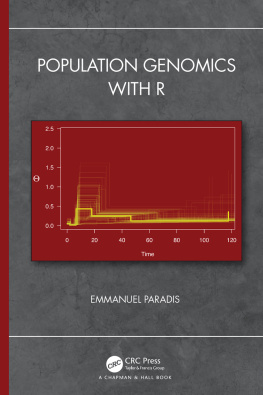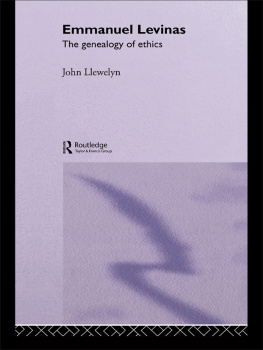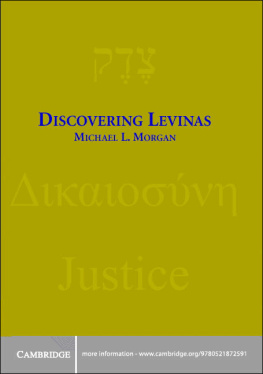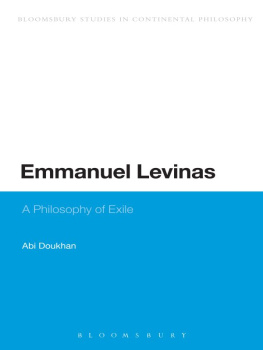Emmanuel de Gibergues - Strength in Simplicity: The Busy Catholics Guide to Growing Closer to God
Here you can read online Emmanuel de Gibergues - Strength in Simplicity: The Busy Catholics Guide to Growing Closer to God full text of the book (entire story) in english for free. Download pdf and epub, get meaning, cover and reviews about this ebook. year: 2014, publisher: Sophia Institute Press, genre: Religion. Description of the work, (preface) as well as reviews are available. Best literature library LitArk.com created for fans of good reading and offers a wide selection of genres:
Romance novel
Science fiction
Adventure
Detective
Science
History
Home and family
Prose
Art
Politics
Computer
Non-fiction
Religion
Business
Children
Humor
Choose a favorite category and find really read worthwhile books. Enjoy immersion in the world of imagination, feel the emotions of the characters or learn something new for yourself, make an fascinating discovery.
- Book:Strength in Simplicity: The Busy Catholics Guide to Growing Closer to God
- Author:
- Publisher:Sophia Institute Press
- Genre:
- Year:2014
- Rating:3 / 5
- Favourites:Add to favourites
- Your mark:
- 60
- 1
- 2
- 3
- 4
- 5
Strength in Simplicity: The Busy Catholics Guide to Growing Closer to God: summary, description and annotation
We offer to read an annotation, description, summary or preface (depends on what the author of the book "Strength in Simplicity: The Busy Catholics Guide to Growing Closer to God" wrote himself). If you haven't found the necessary information about the book — write in the comments, we will try to find it.
Strength in Simplicity: The Busy Catholics Guide to Growing Closer to God — read online for free the complete book (whole text) full work
Below is the text of the book, divided by pages. System saving the place of the last page read, allows you to conveniently read the book "Strength in Simplicity: The Busy Catholics Guide to Growing Closer to God" online for free, without having to search again every time where you left off. Put a bookmark, and you can go to the page where you finished reading at any time.
Font size:
Interval:
Bookmark:
Strength in Simplicity
The Busy Catholics Guide to Growing Closer to God
Emmanuel de Gibergues
SOPHIA INSTITUTE PRESS
Manchester, New Hampshire
Strength in Simplicity was published by Sophia Institute Press in 2000 under the title Keep It Simple . It is an abridged and slightly revised edition of Simplicity According to the Gospel (New York: P. J. Kenedy and Sons, c. 1914).
Copyright 2000 Sophia Institute Press Printed in the United States of America All rights reserved
Cover design: Coronation Media in collaboration
with Perceptions Design Studio.
On the cover: Holy Cross (59374339)
Hans Engbers / Shutterstock.com.
No part of this book may be reproduced, stored in a retrieval system, or transmitted in any form, or by any means, electronic, mechanical, photocopying, or otherwise, without the prior written permission of the publisher, except by a reviewer, who may quote brief passages in a review.
Sophia Institute Press
Box 5284, Manchester, NH 03108
1-800-888-9344
www.SophiaInstitute.com
Sophia Institute Press is a registered trademark of Sophia Institute.
Nihil Obstat: F. Thomas Bergh, O.S.B., Censor Deputatus Imprimatur: Edm. Can. Surmont, Vicarius Generalis Westmonasterii, June 30, 1914
Library of Congress Cataloging-in-Publication Data
Gibergues, Emmanuel de, 1855-1919.[Keep it simple]
Strength in simplicity : the busy Catholics guide to growing closer to God / Emmanuel de Gibergues.
pages cmPreviously published under title: Keep it simple : the busy Catholics guide to growing closer to God, c2000.ISBN 978-1-62282-218-8 (pbk. : alk. paper) 1. Spiritual life Catholic Church. 2. Simplicity Religious aspects Catholic Church. 3. Catholic Church Doctrines. I. Title.BX2350.2.G53 2014
241.4 dc232014019291
Editors note: The biblical references in the following pages are based on the Douay-Rheims translation of the Old and New Testaments. Where applicable, quotations have been cross-referenced with the differing names and enumeration in the Revised Standard Version, using the following symbol: (RSV =).
Chapter One

Understand what simplicity is
Why does the Gospel present to us the dove as the model and ideal of Christian simplicity, saying, Be ye... simple as doves? To understand this, we must have a clear idea of what simplicity really is.
Simplicity, or purity of intention, consists in keeping before yourself, in all your thoughts, words, and acts, one and the same end, one and the same object namely, the pleasing of God, or, more accurately, the doing of His will. Thus understood, simplicity appears to us as a virtue at once essential and far-reaching.
Man was created for God, says St. Ignatius at the beginning of his Spiritual Exercises, in that first meditation, which he justly calls fundamental, because it is the foundation of the whole Christian order. These admirable Spiritual Exercises are based entirely upon this first profound truth; they are, as it were, its commentary and development.
God is, in effect, the sole veritable end, the last end, of man. If man sees only God, seeks only God, and attaches himself only to God; if he voluntarily directs his thoughts, his words, his acts, and his whole life toward God; if, in some sort, he passes amid creatures without pausing, if he fails to find in them his repose as in an end, but desires to rest only in God then he is in the way of truth and order; he is righteous and holy, because he is perfectly simple. The catechism expresses the same idea in saying, Man is created to know God, to love Him, and to serve Him, and thus to reach eternal life.
Now, how do we refer our thoughts, words, and actions to God? By our intention that is, by the motive that determines our will to produce them freely. Our operations and our actions considered in themselves, independent of the motive that has prompted them, have, properly speaking, no moral value; they are bodies without souls. The moral value is in us, in our free will, which is the soul of all that we do and gives to our actions their meaning and their worth.
Men judge us according to the exterior, according to the words that they hear and the actions that they see. This is why they are so often unjust, severe, and ill-natured. But God judges us according to what He sees within; He looks on our heart, our will, our motive, and our intention, and it is according to these that He approves or blames, rewards or punishes.
Such is the meaning of these words in the Gospel: If thy eye be single, thy whole body shall be lightsome. But if thy eye be evil, thy whole body shall be darksome. The eye signifies the intention, for, just as the eye directs our steps, so does the intention guide the movements of our soul. The intention is the eye of our soul. If our soul looks toward God, if it freely directs toward Him our thoughts, words, and actions, then all that we do, all that we say, and all that we think becomes by this very fact supernatural and good. The Gospel expresses this in saying, Thy whole body shall be lightsome.
Thus, the merit of human actions lies wholly in the intention. Our actions have simply the value of our intention.
Thenceforth, simplicity becomes the soul of the spiritual life, since it consists precisely in purity of intention. Simplicity gives to the life of the spirit all its depth and value. The simple soul is ever pleasing to God, because it ever looks toward Him, and seeks for Him always, having no ambition other than to do His will in order to procure His glory.
To be simple is to see, love, and desire God in all creatures and in all things; it is to unify ones life with God.
Chapter Two

Learn to perfect your simplicity
There are degrees in simplicity. Simplicity becomes more elevated and perfect as the intention is more effectively present and as the intention is more pure.
Simplicity asks that we exclude from our intentions all that would be contrary to the divine will and, above all, incompatible with the possession of God, who is our last end in a word, all that theology calls sin, mortal or venial.
In the case of an end permitted or even commanded by God, but which is secondary, simplicity asks that we not attach ourselves to it as to a final end, nor incline ourselves toward an earthly good, be it ever so legitimate, with a desire and a love that would cause us to prefer it to an eternal good.
But, apart from these exceptions, simplicity permits us all freedom concerning inferior and secondary ends when they are legitimate; for example, to express our respect and love for our parents, our gratitude to our benefactors, or our compassion for those who suffer. It permits us to take measures to improve our health, to succeed in an examination, to advance in a career, and to obtain lawful advantages. This is, indeed, all permitted, often praiseworthy, and sometimes commanded.
All these intentions are in the right order of things, because they are conformable to the will of God. In pursuing them, it is God whom we are seeking, and it is God whom we please, if we are careful to refer all to Him.
Therefore, if we firmly determine to exclude all that is displeasing to God, to seek as a secondary end solely what He permits or commands, to attach ourselves only to Him as our final end in other words, if, being in a state of grace, we generously accept all the obligations of a Christian life, having the sincere desire to offer all to God our intention is pure. We effectively practice simplicity as long as our soul remains in this state and attitude, even if we are not always actually thinking of it. The traveler who is on the right road, says St. Thomas, has no need to think at each step of his destination.
Next pageFont size:
Interval:
Bookmark:
Similar books «Strength in Simplicity: The Busy Catholics Guide to Growing Closer to God»
Look at similar books to Strength in Simplicity: The Busy Catholics Guide to Growing Closer to God. We have selected literature similar in name and meaning in the hope of providing readers with more options to find new, interesting, not yet read works.
Discussion, reviews of the book Strength in Simplicity: The Busy Catholics Guide to Growing Closer to God and just readers' own opinions. Leave your comments, write what you think about the work, its meaning or the main characters. Specify what exactly you liked and what you didn't like, and why you think so.

